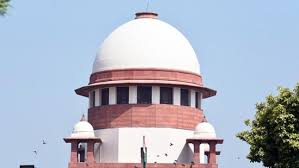Sub-section (2) of Section 52A of the NDPS Act mandates a competent officer to prepare an inventory of such narcotic drugs with adequate particulars. This has to be followed through an appropriate application to the Magistrate concerned for the purpose of certifying the correctness of inventory, taking relevant photographs in his presence and certifying them as true or taking drawal of samples in his presence with due certification. Such an application can be filed for anyone of the aforesaid three purposes. The objective behind this provision is to have an element of supervision by the magistrate over the disposal of seized contraband. Such inventories, photographs and list of samples drawn with certification by Magistrates would constitute as a primary evidence. Therefore, when there is non-compliance of Section 52A of the NDPS Act, where a certification of a magistrate is lacking any inventory, photograph or list of samples would not constitute primary evidence. (Para 5)
The obvious reason behind this provision is to inject fair play in the process of investigation. Section 52A of the NDPS Act is a mandatory rule of evidence which requires the physical presence of a Magistrate followed by an order facilitating his approval either for certifying an inventory or for a photograph taken apart from list of samples drawn. (Para 6)
Before any proposed disposal/destruction mandate of Section 52A of the NPDS Act requires to be duly complied with starting with an application to that effect. A Court should be satisfied with such compliance while deciding the case. The onus is entirely on the prosecution in a given case to satisfy the Court when such an issue arises for consideration. Production of seized material is a factor to establish seizure followed by recovery. One has to remember that the provisions of the NDPS Act are both stringent and rigorous and therefore the burden heavily lies on the prosecution. Non-production of a physical evidence would lead to a negative inference within the meaning of Section 114(g) of the Indian Evidence Act, 1872 (hereinafter referred to as the Evidence Act). The procedure contemplated through the notification has an element of fair play such as the deposit of the seal, numbering the containers in seriatim wise and keeping them in lots preceded by compliance of the procedure for drawing samples. (Para 8)
The memorandum of informer’s information dated 20.05.2010 exhibited under P-3 indicates signature of two witnesses, P.W2 and P.W6, both of them turned hostile. Though they admitted their signature it was clearly deposed that they were not present at the scene of occurrence. In our considered view the Court below have wrongly construed the evidence, in fact these two witnesses were party to most of the exhibits running upto 13. Search warrant under Exhibit P-4 acknowledge the fact that procedure contemplated under the NDPS Act has not been followed. As noted, one of the witnesses to the seizure memo has not been examined while the other turned hostile. Both the witnesses to the arrest memo have not been examined. On the issue of non-production of narcotic substance and panch witnesses turning hostile we wish to reiterate the decision of this Court in Jitendra v. State of M.P., (2004) 10 SCC 562: (Para 11)
There is no explanation either for non-production of the seized materials or the manner in which they are disposed of. No order passed by the Magistrate allowing the application, if any, filed under Section 52A of the NDPS Act. P.W.10, Executive Magistrate has deposed to the fact that he did not pass any order for the disposal of the narcotics substance allegedly seized. Similarly, P.W.12 who is In-charge of Malkhana also did not remember any such order having been passed. (Para 12)
There is a serious doubt with respect to the seizure. P.W.5 who was a police officer himself had deposed on the existence of the very same seized materials even before the occurrence. This testimony which destroys the very basis of the prosecution case has not even been challenged. (Para 14)
Both the Courts have mechanically placed reliance on the FSL Report while taking the statement of P.W.11 as the gospel truth. The views expressed by him can at best be taken as opinion at least on certain aspects. There are too many material irregularities which create a serious doubt on the very case of the prosecution. On a proper analysis we have no hesitation in holding that the impugned judgments are liable to be set aside and the appellant is to be acquitted by rendering the benefit of doubt. (Para 14)
In the result, the appeal is allowed. The conviction and sentence rendered by the Additional Sessions Judge, Special Court NDPS, Jaora, District Ratlam, Madhya Pradesh in Special Sessions No. 19/2010 as confirmed by the High Court of Madhya Pradesh in Criminal Appeal No. 6163 of 2017 stands set aside. (Para 15)
SUPREME COURT JUDGMENT
Citation:STPL(Web) 75 SC
MANGILAL Vs. STATE OF MADHYA PRADESH
Criminal Appeal No. 1651 of 2023-Decided on 12-7-2023
Click to See Full Text of Judgment: 2023 STPL(WEB) 75 SC







